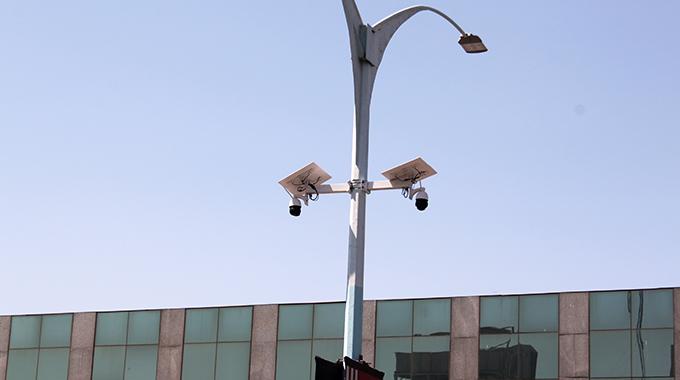News / Local
Zimbabwe marks rise in digital surveillance
8 hrs ago | Views

Zimbabwe is experiencing an alarming increase in digital surveillance by government authorities, severely impacting civil liberties and intensifying repression against journalists and human rights defenders (HRDs), according to a new report by Unwanted Witness.
Titled "Surveillance/Spyware: An Impediment to Civil Society, HRDs and Journalists in East & Southern Africa," the report was launched in Harare on Friday and highlights the troubling expansion of state surveillance powers facilitated by laws such as the Cyber and Data Protection Act.
The legislation, ostensibly enacted to bolster national security, grants the government sweeping authority to monitor citizens' digital communications and access personal data, all with minimal judicial oversight. This legal framework effectively enables mass surveillance that targets activists, independent media, and political opponents.
"Zimbabwe's surveillance law grants the State sweeping surveillance powers, enabling mass monitoring of individuals under the guise of national security. These laws lack adequate judicial oversight, raising serious concerns about privacy, civil liberties, and freedom of expression," the report states.
It further warns that the Cyber and Data Protection Act provides law enforcement unrestricted access to digital data, with no independent bodies empowered to regulate or check these invasive powers. As a result, journalists and HRDs operate under constant threat of surveillance, fostering self-censorship and fear of persecution.
A glaring example cited is the case of Blessed Mhlanga, a senior journalist with Alpha Media Holdings, who was arrested under the Cyber and Data Protection Act earlier this year. Mhlanga spent over 70 days in pre-trial detention, drawing international condemnation and highlighting the Act's chilling effect on press freedom.
The report draws a clear link between surveillance intensification and political repression, particularly around sensitive periods such as elections and constitutional debates.
"In early 2025, Zimbabwe's government intensified its crackdown on dissent, exemplified by the seventy-nine day detention of journalist Blessed Mhlanga, alongside repeated arrests of critics like Hopewell Chin'ono and Jacob Ngarivhume, likely facilitated by spyware surveillance," the report notes, referencing findings from the Committee to Protect Journalists.
Unwanted Witness also highlights how internal power struggles within the ruling ZANU-PF party have coincided with heightened surveillance activities. As debates unfolded over constitutional amendments to extend President Emmerson Mnangagwa's tenure beyond constitutional limits, state monitoring escalated markedly.
"Amid 2024–2025 debates on constitutional amendments to extend presidential term limits, CCTV expansion in Harare has coincided with heightened activist monitoring. The 2021 Cyber and Data Protection Law provides no oversight, enabling surveillance abuses in a polarised political climate, with data likely fuelling targeted spyware operations," the research stresses.
The report calls for urgent reforms to introduce independent oversight mechanisms and to safeguard fundamental freedoms in Zimbabwe's increasingly digitised public sphere. Without such interventions, digital surveillance threatens to further erode the space for free expression, political activism, and journalistic integrity in the country.
Titled "Surveillance/Spyware: An Impediment to Civil Society, HRDs and Journalists in East & Southern Africa," the report was launched in Harare on Friday and highlights the troubling expansion of state surveillance powers facilitated by laws such as the Cyber and Data Protection Act.
The legislation, ostensibly enacted to bolster national security, grants the government sweeping authority to monitor citizens' digital communications and access personal data, all with minimal judicial oversight. This legal framework effectively enables mass surveillance that targets activists, independent media, and political opponents.
"Zimbabwe's surveillance law grants the State sweeping surveillance powers, enabling mass monitoring of individuals under the guise of national security. These laws lack adequate judicial oversight, raising serious concerns about privacy, civil liberties, and freedom of expression," the report states.
It further warns that the Cyber and Data Protection Act provides law enforcement unrestricted access to digital data, with no independent bodies empowered to regulate or check these invasive powers. As a result, journalists and HRDs operate under constant threat of surveillance, fostering self-censorship and fear of persecution.
A glaring example cited is the case of Blessed Mhlanga, a senior journalist with Alpha Media Holdings, who was arrested under the Cyber and Data Protection Act earlier this year. Mhlanga spent over 70 days in pre-trial detention, drawing international condemnation and highlighting the Act's chilling effect on press freedom.
The report draws a clear link between surveillance intensification and political repression, particularly around sensitive periods such as elections and constitutional debates.
"In early 2025, Zimbabwe's government intensified its crackdown on dissent, exemplified by the seventy-nine day detention of journalist Blessed Mhlanga, alongside repeated arrests of critics like Hopewell Chin'ono and Jacob Ngarivhume, likely facilitated by spyware surveillance," the report notes, referencing findings from the Committee to Protect Journalists.
Unwanted Witness also highlights how internal power struggles within the ruling ZANU-PF party have coincided with heightened surveillance activities. As debates unfolded over constitutional amendments to extend President Emmerson Mnangagwa's tenure beyond constitutional limits, state monitoring escalated markedly.
"Amid 2024–2025 debates on constitutional amendments to extend presidential term limits, CCTV expansion in Harare has coincided with heightened activist monitoring. The 2021 Cyber and Data Protection Law provides no oversight, enabling surveillance abuses in a polarised political climate, with data likely fuelling targeted spyware operations," the research stresses.
The report calls for urgent reforms to introduce independent oversight mechanisms and to safeguard fundamental freedoms in Zimbabwe's increasingly digitised public sphere. Without such interventions, digital surveillance threatens to further erode the space for free expression, political activism, and journalistic integrity in the country.
Source - NewZimbabwe





































